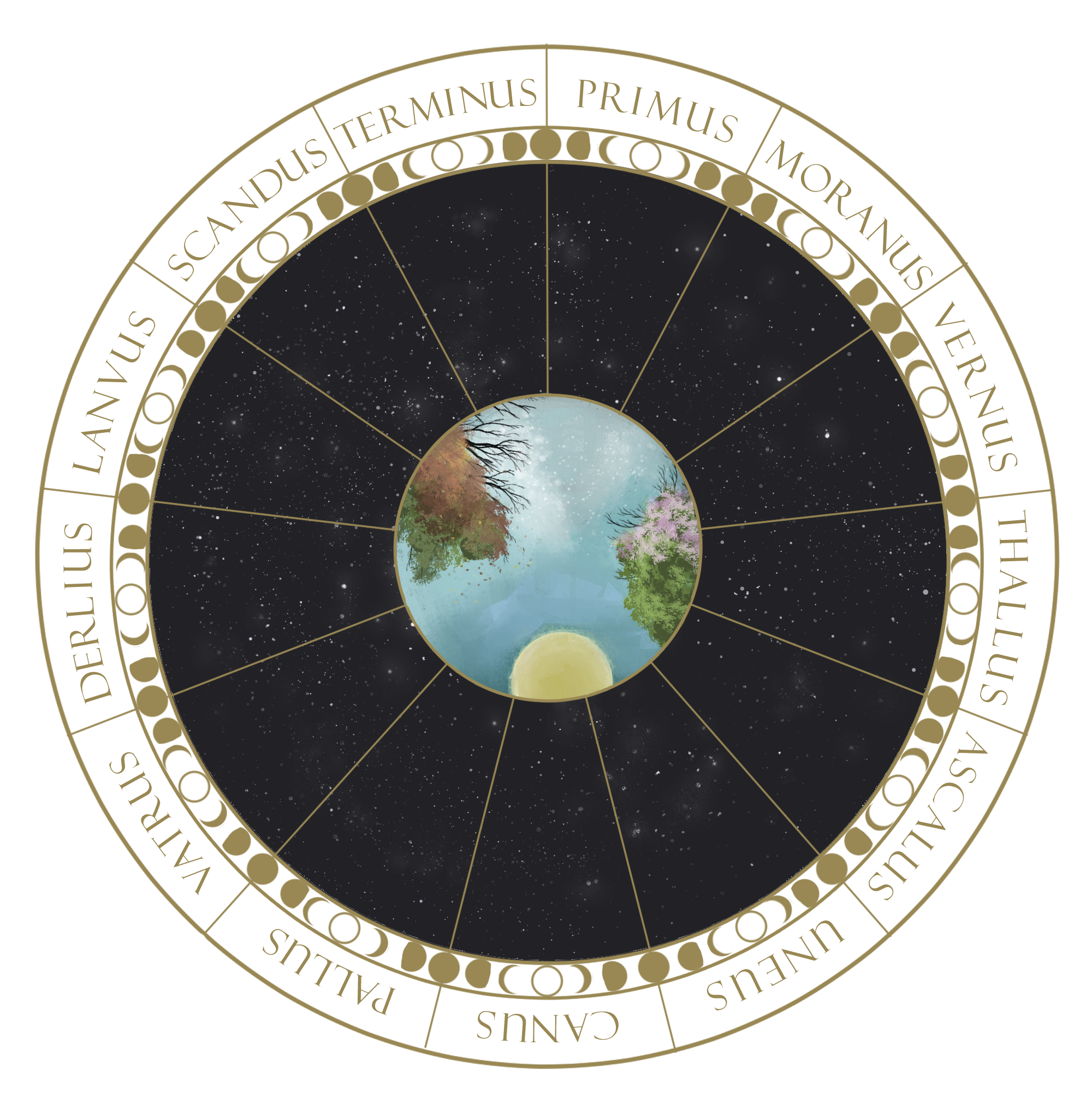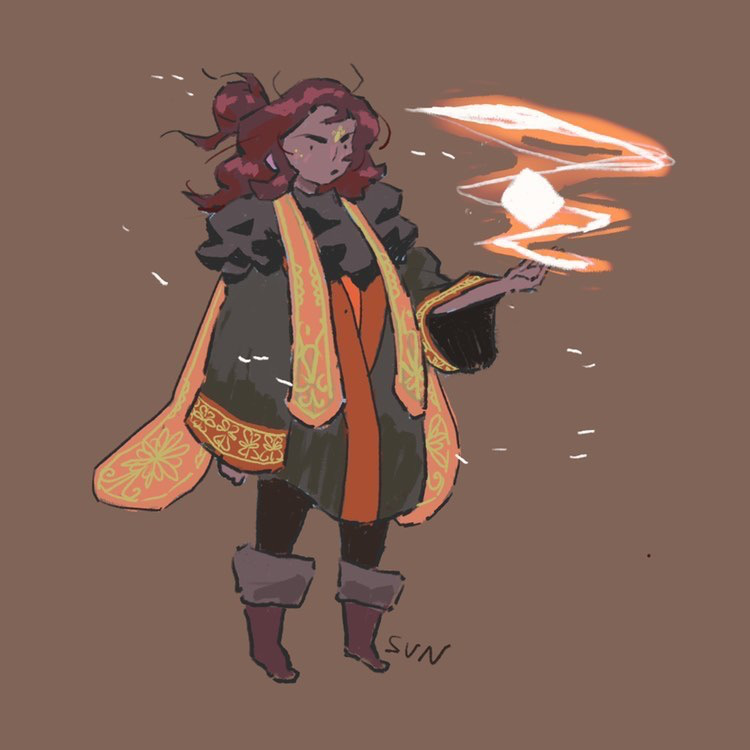Created in 4978
EA, the Etrean Standard Calendar is the brainchild of a group of academics from one of the major
universities in
Kaien. It was originally created to facilitate diplomatic arrangements, but quickly grew popular in mercantile enterprises and from there spread across the world.
The calendar is comprised of thirteen months of twenty-eight days each, and is predominantly based on the movements and phases of
the moon.
History
Before the existance of the Standard Calendar, the year was measured in a variety of ways by different cultures and peoples. It was measured by the changing of the moon, or the movement of stars in the night sky. It was measured by the passing of the seasons, or the migration patterns of animals. Some countries relied on several different calendars, depending on profession. There was no cohesion from one country to the next, and this proved time and again to make international relations difficult.
The Etrean Standard Calendar is the brainchild of
Simon Cross, a Kaienese academic from the prestigious
Marble Downs University. Alongside his colleage,
David Milton, Cross assembled a group of academics from across the world to create a calendar that could be used and recognised internationally. It took the group of ten almost a year to create a system that all of them agreed on.
The finished calendar was officially debuted in 4879 EA during the planning stages of
diplomatic talks between the leaders of mainland
Caia. These talks prevented a war between
Zenra and
Akara, and some scholars believe that the Etrean Standard Calendar was instrumental to their success.
In the years that followed, the Standard Calendar spread slowly across the world. Its adoption by merchants trading by sea meant that it was able to travel vast distances, beyond what Cross and Milton ever believed was possible. Whilst some cultures remain resitant to the Standard Calendar, it has become almost mandatory for both trade and diplomatic relations.
Criticism and Controversy
They say this calendar is meant to unify us, to bring the world closer together. But how can that be the case when it rides roughshod over the traditions and norms of the south?— A Dissenter
In the years following the introduction of the Etrean Standard Calendar, several criticisms emerged, especially from countries that had not been involved in its creation.
The largest and most often cited criticism is that the naming of the months reflect the seasons of the northern hemisphere, and completely ignore the differences present in the southern hemisphere. For example, the month of Derlius, based on the
Lurian word for 'harvest', reflects the harvest season for the north. In the south, this same month heralds the beginning of the planting season. Proponents of the Etrean Standard Calendar argue that the names of the months are just that - names. Their purpose is to differentiate the months from each other, not to define them.
The other criticism levelled against the calendar is that it displaces traditional methods of timekeeping, and that it is a step on the slippery slope towards a homogenised, monotonous world. Whilst the loss of traditions is a genuine concern to many people, this argument is generally seen as fearmongering towards the idea of globalisation, something that scholars believe would not be viable for many years to come.
In 5291 EA, a politician from
Dryst created a southern-centric version of the Etrean Standard Calendar. This
calendar used month names that reflected the southern hemisphere's experience of the seasons. However, by this point in time the Etrean Standard Calendar was in common use across the world, and his work has not yet caught on.
The Calendar
Primus
Taken from the
Eshuan word for 'first' or 'beginning', Primus is generally considered the first month of the year.
Moranus
Moranus comes from an amalgamation of the
Kaienese and
Seruic words for 'forest' and 'hidden'.
Vernus
Vernus is derived from the
Bazuurine word for 'renewal' or 'rebirth', as well as the
Eriasian word for 'frost'.
Thallus
Thallus is derived from the most common name of the one true
Coranish god,
Thallase.
Ascalus
Ascalus is formed from a combination of the Kaienese and Seruic words for 'blooming' and 'warmth'.
Uneus
Uneus comes from the Bazuurine word for 'heat' and 'sun'. Its pronunciation is often a point of contention.
Canus
Canus is named after the
Caillish king,
Cane II, who was in power when the calendar was being conceived. This month is also the month
Caillah was founded.
Pallus
Pallus is derived from both the Kaienese and Seruic words for 'peace', which echoes one of Cross's hopes for the calendar.
Vatrus
Vatrus come from the
Zenran word for 'fire', 'heat', and 'the colour of the sun on the water'.
Derlius
Derlius is derived from the Lurian word for 'harvest'. It is the month that most often draws the criticism from detractors.
Lanvus
Lanvus is taken from the
Akaran word for 'change'. It refers to how the leaves change colour as the weather grows colder.
Scandus
Scandus is derived from the Akaran words for 'slow' and 'calm', reflecting the winding down of the year.
Terminus
Taken from the Eshuan word for 'ending', Terminus was chosen as a mirror to Primus. It is generally considered to be the last month of the year.













What a nice and informative article! I love the controversy section the most. It's interesting. :D
Come visits Terraloga and the story of a fictional Ancient Roman trying to rule the world.
Thank you! :D I had fun with that bit!